-
Home
Home
Learn More About the Various Functions within SAARC Finance
Home -
About Us
About Us
Learn more about the various functions within The Reserve Bank of India
About Us-
About SAARCFinance
About SAARCFinance
-
Country Information
Country Information
-
About SAARCFinance
-
Events
Events
Learn more about the various functions within The Reserve Bank of India
Events-
Governor's Symposium
Governor's Symposium
-
Meetings
Meetings
-
Seminars
Seminars
-
Governor's Symposium
-
Initiative
Initiative
Learn more about the various functions within The Reserve Bank of India
Initiative-
SWAP
SWAP
-
Capacity Building
Capacity Building
-
Others
Others
-
SWAP
-
Research / Publications
Research / Publications
Learn more about the various functions within The Reserve Bank of India
Research / Publications-
E-Newsletter
E-Newsletter
-
Collaborative studies
Collaborative studies
-
Central bank Publications/Papers
Central bank Publications/Papers
-
E-Newsletter
-
Key Officials
Key Officials
Learn more about the various functions within The Reserve Bank of India
Key Officials
Seminars - SAARCFINANCE - Reserve Bank of India
 IST,
IST,




Upcoming Seminars
There are no upcoming seminars to show at this time.
The officers of SAARCFINANCE central banks (Nepal Rastra Bank, Royal Monetary Authority of Bhutan, Maldives Monetary Authority, Bangladesh Bank, and Central Bank of Sri Lanka) participated in the Workshop on Climate Change Risks and Finance organised by the Reserve Bank of India in New Delhi on March 11-12, 2025.
The welcome remarks for the workshop were given by Shri Yogesh Dayal, CGM-in-Charge of the International Department, RBI.
The workshop covered issues related to transmission channels of climate risk and credit risk sensitivity; assessment of transition and physical risks; scenario analysis and stress testing; measuring hazard, vulnerability, and exposure of physical risks; regulatory perspective on the importance of climate change adoption; and experience sharing on climate risk assessment. Two panel discussions on “Green and Climate Financing” and “Practical Insights on transition risk assessment from foreign commercial banks” were also held.
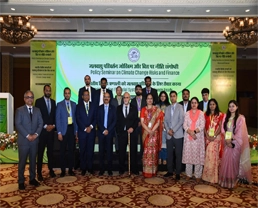
Workshop on Climate Change Risks and Finance held on March 11-12, 2025
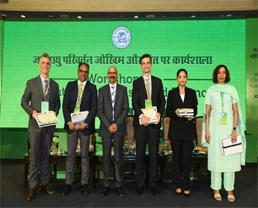
Workshop on Climate Change Risks and Finance held on March 11-12, 2025
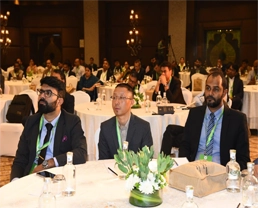
Workshop on Climate Change Risks and Finance held on March 11-12, 2025
The SAARCFINANCE Seminar on "Trading in Local Currencies: Problems and Prospects for the SAARC Countries" has been organized by the SAARCFINANCE Wing, Research Department of Bangladesh Bank on July 12, 2024 at Hotel Radisson Blu in Chattogram. The Inaugural Session was graced by Mr. Abdur Rouf Talukder, Honorable Governor of Bangladesh Bank, as the Chief Guest. Dr. Md. Khairuzzaman Mozumder, Honorable Secretary of the Finance Division, Ministry of Finance, Government of the People's Republic of Bangladesh, participated as the Special Guest. In addition, Dr. Md. Habibur Rahman, Deputy Governor of Bangladesh Bank, delivered the Keynote Speech in the inaugural session and Dr. Aditya Gaiha, Chief General Manager (in-charge) from the Reserve Bank of India (RBI), was also present as a Special Guest. Dr. Sayera Younus, Executive Director (Research) of Bangladesh Bank presented the Welcome Remarks. The inaugural session of the SAARCFINANCE seminar began with Tilawat-e-Quran at 9:00 am. Dr. Sayera Younus, welcomed attendees, highlighting the benefits for regional economic development and the seminar's goal of exploring local currency trading among SAARC countries. After welcome remarks, Dr. Md. Habibur Rahman, Deputy Governor of Bangladesh Bank, emphasized the benefits of trading in local currencies, such as reducing pressure on major trading currencies in Forex reserves, enhancing bilateral trade, and lowering transaction costs in his keynote speech. Dr. Aditya Gaiha, Special guest in the inaugural session at the SAARCFINANCE Seminar from RBI pointed the importance of local currency trading for policymakers, central banks, and economic stakeholders. He marked some challenges such as foreign exchange reserves, external liabilities, and macroeconomic instability exacerbated by post-COVID conditions and geopolitical tensions. He argued that local currencies are crucial in addressing these mentioned challenges, where fifteen to sixteen developing nations have already struggling with the shortage of foreign exchange reserves. Dr. Md. Khairuzzaman Mozumder, Honorable Secretary of the Finance Division, Ministry of Finance, mentioned the importance of reducing reliance on dominant currencies for the SAARC region. The Honorable Governor of Bangladesh Bank, Mr. Abdur Rouf Talukder addressed the strategic importance of trading in local currencies for reducing US dollar dependency, economic stability and regional integration. He discussed Bangladesh's policy changes and digital financial technologies to facilitate this trade and urged collaborative efforts to overcome challenges, also inviting foreign delegates to explore Chattogram's natural regional potentials. The participants from SAARC member central banks from Bangladesh, Bhutan, India, Maldives, Nepal, Pakistan and Sri Lanka presented their papers on “Trading in Local Currencies: Problems and Prospects for the SAARC Countries,” and highlighted the benefits of reduced dependency on leading currencies and lower transaction costs. Distinguished panelists discussed challenges such as currency stability and the need for robust financial infrastructure. The primary objective of this seminar is to explore prospective strategies and policies among the emerging economies of South Asia to reduce dependence on major global currencies such as the US dollar, Euro and Pound sterling. The discussions aimed to identify ways to reduce transaction costs, minimize exchange rate volatility, and enhance regional economic integration based on absolute and comparative advantages among others encouraging regional currency SWAP, Forward and regional market other innovative derivatives with tolerable risk appetite. Key issues of this seminar to be addressed include the challenges of transitioning to local currency trading, the impact on existing trade agreements, and the readiness of financial institutions to promote such initiatives. |
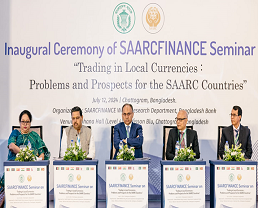
SAARCFINANCE Seminar 2024 hosted by Bangladesh Bank

Hon'ble Governor, Hon'ble Secretary, Hon'ble Deputy Governor, Hon'ble Executive Directors, Domestic Participants and Representatives of Central Banks of SAARC Countries on the occasion of SAARCFINANCE Seminar
The Central Bank of Sri Lanka hosted the 45th SAARCFINANCE Governors’ Meeting and Symposium during 13-14 June 2024 in Colombo. The event was attended by the Governors, Finance Secretaries, and other delegates from the Central Banks and Ministries of Finance in the SAARC region.
The SAARCFINANCE Governors’ Symposium, themed “Central Banking amid Multi-faceted Global Economic Challenges,” was held on the first day of the event. Honourable Ranil Wickramasinghe, the President of Sri Lanka and Minister of Finance, Economic Stabilisation, and National Policies, graced the inaugural ceremony and delivered the keynote speech. In his address, the President emphasised the importance of strengthening regional cooperation to tackle contemporary economic challenges and promote growth. He also reiterated the need for monetary and fiscal stability and highlighted the efforts being taken to strengthen the legal framework to ensure lasting stability in the country. The Secretary General of SAARC, Ambassador Md. Golam Sarwar also attended the inauguration.
The day’s proceedings also comprised two insightful panel discussions. Governor Maha Prasad Adhikari of the Nepal Rastra Bank, Governor Ali Hashim of the Maldives Monetary Authority, and Secretary to the Treasury K. M. Mahinda Siriwardana were the panellists on the first panel that discussed “Challenges and Opportunities of Evolving Global Economic Dynamics to SAARC Countries: Sharing Experience”. This was moderated by Dr. Ganeshan Wignaraja, Visiting Senior Fellow at ODI.
The second panel discussion was themed “Revisiting Monetary Policy Processes and Paradigms in SAARC Countries: Policy Puzzles, Solutions, and Lessons Learnt”. The panellists were Governor Dasho Penjore of the Royal Monetary Authority of Bhutan, Governor Dr. Nandalal Weerasinghe of the Central Bank of Sri Lanka, and Deputy Governor Saleem Ullah of the State Bank of Pakistan, and the discussion was moderated by Dr. (Ms.) Dushni Weerakoon, member of the Monetary Policy Board and Executive Director of the Institute of Policy Studies of Sri Lanka.
The 45th SAARCFINANCE Governors’ Group Meeting was held on the second day of the event, focusing on further enhancing cooperation and collaboration among member nations on various contemporary economic and financial sector matters.
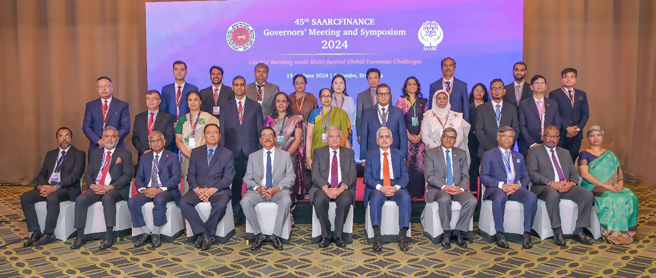
45th SAARCFINANCE Governors’ Meeting and Symposium
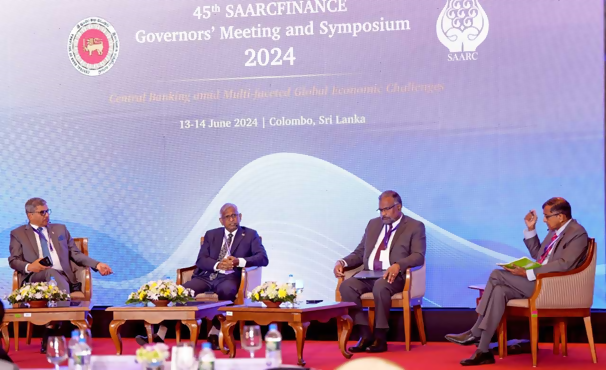
45th SAARCFINANCE Governors’ Meeting and Symposium
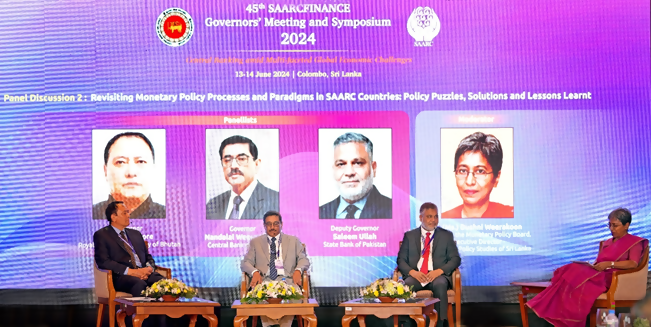
45th SAARCFINANCE Governors’ Meeting and Symposium
The State Bank of Pakistan organized a SAARCFINANCE seminar on ‘The Potential Role of Big
Data in Economic Policy’ on March 6, 2024, at NIBAF Islamabad. Governor SBP, Mr. Jameel Ahmad, graced the event as Chief Guest and inaugurated the seminar with a keynote address. The event was attended by experts in the field, key stakeholders, policy makers and delegates from SAARC member countries. Officials from SAARC central banks attended the seminar virtually as well.
SAARCFINANCE was officially established in 1998 as a regional network of SAARC Central Bank Governors and Finance Secretaries, aimed at creating a joint platform for institutions responsible for macro-economic policy making in South Asia. With the overarching objective “to conduct a dialogue on macro-economic policies of the region and share experiences and ideas of the member countries”, the SAARCFINANCE holds these seminars for member countries to come together, exchange ideas, and gain valuable insights on critical topics.
In his keynote address, Governor SBP, Mr. Jameel Ahmad, highlighted the evolution of Big Data as a valuable tool, characterized by its unprecedented volume and its potential to fuel economic growth, societal welfare and improve living standards across the SAARC region. He talked about its ubiquity as a result of increased social media interactions and financial transactions, as well as how it could be used in econometric analysis to develop new tools for risk assessment and financial policies. He also explained its utility in Artificial Intelligence and machine learning algorithms to generate text analysis, automate processes and bring more efficiency in operations.
Accentuating its practical Application, Mr. Jameel Ahmad described its employment by central banks in research and formulation of monetary policy, maintaining financial system stability and supervision and regulation of the financial system (commonly called SupTech and RegTech).
He outlined how the State Bank has been taking steps to institutionalize the use of Big Data by allowing regulated entities the use of cloud services to manage Big Data, and launching RAAST, its state-of-the-art fast payment system which generates large volumes of transactions. He emphasized the need to introduce a data-driven culture, by promoting interoperability and collaboration between regulated financial institutions and non-regulated fintechs, as well as developing an open banking framework for financial inclusion and digitization.
Speaking on the challenges in adoption of Big Data technology, he mentioned that there exist legal concerns related to the privacy and confidentiality of data. Further, there is a large cost involved in the development of required infrastructure, both hardware and software, and in building capacity in the form of skilled data scientists proficient in Big Data analytics.
He concluded by inviting member nations of SAARC to collaborate on developing regional big data initiatives, sharing knowledge, technology, and best practices. He envisioned the emergence of SAARC as a data-driven region that can respond with agility to the economic challenges of the new age.
Earlier, the Managing Director NIBAF, Mr. Riaz Chunara, welcomed the participants and highlighted importance of the SAARCFINANCE Seminars especially the current theme. The rest of the seminar featured three keynote speeches by Mr. Matthew Saal, Digital Finance Expert, International Finance Corporation (IFC), Dr. Naeem uz Zafar, Chief Statistician, Pakistan Bureau of Statistics and Dr. Ishrat Husain, former -Governor SBP. There were also two panels on the topics “Collaborative Frameworks for Economic Data sharing between Regions: Opportunities and Challenges” and “Leveraging insights from Big Data to improve Economic Growth, Development and Financial Inclusion”. Panelists were esteemed policy makers and market professionals from reputed national and international organizations such as IMF, World Bank, IFC, Google, Meta, Buna (Arab Regional Payments Clearing and Settlement Organization), CGAP and Pakistan Bureau of Statistics.
Following the successful completion of the Seminar, the next day (March 7,2024) begin with the SF Database working group meeting, having participants from all SAARC central banks through a blend of virtual connectivity and in-person attendance. Following the productive meeting, an excursion trip to Taxila Museum, Sirkup Village and Mabali Island was arranged for the delegates from member SAARC countries, accompanied by State Bank staff. In the museum, they visited Buddhist relics, sculptures and art preserved from the ancient Gandharan civilization, after which they explored a settlement site (Sirkup) of the same civilization. Afterwards, they enjoyed a boat ride and lunch at the serene Mabali Island, a resort encompassing a portion of the lake captured by Khanpur Dam.
Reserve Bank of India organized a SAARCFINANCE seminar on Emerging Digital
Technologies in Central Banking and Finance at Anjuna, Goa during January 1718, 2024. The two-day seminar marked the fulfilment of the commitment made by the
Reserve Bank in the 44th meeting of the SAARCFINANCE Governors’ Group held in October 2023. The Seminar has focussed on the opportunities of emerging digital technologies like Artificial Intelligence (AI), Machine Learning (ML) and Large Language Model (LLM) in central banking, ways to leverage these technologies and challenges associated with the adoption of it. The seminar was attended, both inperson and virtually, by the central bank officials from SAARC countries viz. Bangladesh, Bhutan, Maldives, Nepal, Pakistan, Sri Lanka and India.
Shri R Subramanian, Executive Director, RBI welcomed the participants of the Seminar, highlighting the importance of leveraging new frontiers of technologies in various functional areas of SAARC central banks. Dr. Michael D. Patra, Deputy Governor, RBI delivered keynote address of the Seminar. Dr. Patra illustrated the opportunities and challenges associated with the emerging digital technologies, global experiences on this front and emphasised on how central banks need to navigate this technological shift. The Deputy Governor also highlighted some of the recent initiatives and developments made by the RBI in the technological domain. He underscored the need of the central banks to invest generously to develop niche capabilities in data science (full text of the speech available at https://website.rbi.org.in/web/rbi/-/speeches-interview/harnessing-digital-technologies-in-central-banks-opportunities-and-challenges). Ms. Gunjeet Kaur, Officer in Charge, International Department, delivered closing remarks for the inaugural session of the Seminar.
Professor Pulak Ghosh (IIM, Bangalore), Mr. Rajesh Bansal (Reserve Bank Innovation Hub), Mr. Nipun Kalra and Deep Mukherjee (BCG), Mr. Rahul Matthan (Trilegal) and
Ms. Geetha Giddi (RBI) handled various sessions related to Artificial Intelligence (AI), Machine Learning (ML), big tech and data science, frictionless credit, Sup Tech and
ensuing legal, governance, privacy and ethical issues. Mr. Harish Natarajan and Mr.Venkat Bhargav from the World Bank covered the importance of Digital Public Infrastructure for financial inclusion in the case of India as well as for entire SAARC region.
A fireside chat on “Adopting Digital Technologies in Central Banks” was also organised wherein the panel shared the experience and perspective of RBI in the use of emerging technologies in various area of its operations, for the benefit of other SAARC central banks.
The delegates from other SAARCFINANCE member-central banks deliberated upon various aspects of AI and also highlighted the efforts that their central banks are taking to adopt the emerging digital technologies. Dr. Ajesh Palayi (SAARCFINANCE Alternate Coordinator, RBI) delivered the vote of thanks.
Maldives Monetary Authority organized the SAARCFINANCE Database Seminar on "Use of High-Frequency Indicators by Central Banks: Experience and Plans Going Forward" and the Database Working Group Meeting on November 2, 2022.
The seminar was inaugurated with a speech by Mr. Ali Hashim, Governor, Maldives Monetary Authority. The keynote was delivered by Ms. Aishath Hassan, Chief Statistician, Maldives Bureau of Statistics. The country papers on the theme and objective of the seminar were presented by participants from the respective SAARC central banks. The objective of the seminar was to provide a forum to share and discuss country experiences in the use of high-frequency indicators for monitoring economic developments, highlighting on current practices, issues and plans to develop additional high-frequency indicators. The seminar also covered strategies to overcome the deficiencies in traditional data sources by utilizing big data.
The seminar was followed by the SAARCFINANCE Database Working Group Meeting, chaired by the Reserve Bank of India. Officials from SAARC central banks, nodal officers of the SAARCFINANCE Database, Working Group members, SAARCFINANCE coordinators and alternate coordinators attended the meeting.
Bangladesh Bank organized the SAARCFINANCE Database Webinar on: “COVID-19 Pandemic in the SAARC Countries: Policy Responses and its Impact” & Database Working Group Meeting on June 22, 2021. Dr. Sayera Younus, SAARCFINANCE Coordinator, Bangladesh Bank welcomed the delegates. The seminar was inaugurated with a speech by special guest Mr. A.K.M. Fazlul Haque Mia, Executive Director (Statistics), Bangladesh Bank. The keynote address was delivered by Dr. Mridul Kumar Saggar, Executive Director, Reserve Bank of India followed by speeches of chief guest Mr. Abu Farah Md. Nasser, Deputy Governor, Bangladesh Bank and Chairperson Mr. Asish Kumar Dasgupta, Executive Director (Research), Bangladesh Bank.
The country papers on the theme of the webinar were presented by the authors of the papers. The session was followed by SAARCFINANCE Database Working Group Meeting. The webinar was attended by distinguished Guests, SAARC central banks officials, Nodal officers, Working Group members, and SAARCFINANCE Coordinators and Alternate Coordinators.
The detailed brochure of the webinar and country papers from respective SAARC Countries are provided for reference.
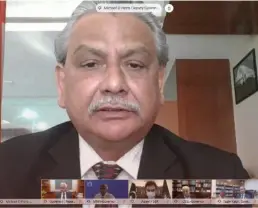
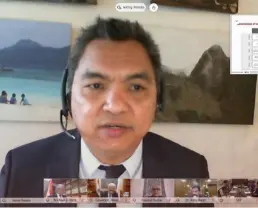

State Bank of Pakistan hosted the seminar on “Economic Modeling and Forecasting - Practices in Central Banks”, on April 6, 2021, which was held virtually under the SAARCFINANCE forum – the regional network of SAARC central banks and finance ministries. Besides Pakistan, officials from central banks of Afghanistan, Bangladesh, Bhutan, India, Maldives, Nepal, and Sri Lanka attended the webinar.
Dr. Murtaza Syed, Deputy Governor, SBP, inaugurated the webinar. In his opening remarks, Dr. Syed highlighted the importance of macroeconomic modeling for efficient application of policy instruments in the face of uncertainties and lags in transmission. He stressed the need to continuously update the technology by incorporating latest modeling techniques and emerging challenges, like the Covid-19 pandemic and climate change.
The speakers presented their insightful research on different areas of macroeconomic modeling and forecasting. Professor Vasco J. Gabriel, Reader in Economics, University of Surrey, shared a framework to implement money growth rules in a medium-sized emerging open economy. He showed that applying this model to actual data yields insightful results. Dr. Wasim Shahid Malik, SBP Chair, University of Peshawar drew the attention of researchers and policy makers towards the long-term gains associated with disinflationary policies. The third speaker, Mr. Azhar Iqbal, from Wells Fargo Securities, USA, shared interesting and innovative developments in modeling and forecasting of macroeconomic variables, including in the context of heightened uncertainty stemming from the Covid-19 pandemic. His proposals to construct an Animal Spirits Index as well as studying the asymmetric effects of Covid-19 on growth and inflation in SAARC economies is likely to be extremely relevant for policymaking.
Officials from SAARC central banks shared the evolution and current state of economic modeling at their respective institutions. The seminar provided researchers from SAARC countries a valuable and unique opportunity for knowledge sharing and learning from each other’s experiences.
Dr. Farooq Arby, Director Research, SBP, summed-up the discussion and appreciated the guest lecturers and presenters from the SAARC central banks. He expressed his hope that this seminar would contribute towards capacity building and enriching the frameworks used by SAARC central banks.
The Reserve Bank is the current Chair of the SAARCFINANCE, a network of central bankers in the SAARC region. International Department under the aegis of the SAARCFINANCE seminar organised a virtual talk on Artificial Intelligence and Central Banking on August 12, 2020. Dr. David Hardoon, an eminent data scientist and Senior Advisor for Data and Artificial Intelligence at Union Bank, Philippines delivered the talk. The Seminar was attended by more than 100 participants from central banks of SAARC countries, viz. Afghanistan, Bangladesh, Bhutan, Nepal, Pakistan, Sri Lanka as well as officials of select central office departments of the Reserve Bank.
Dr. Mohua Roy, Adviser, International Department inaugurated the seminar by highlighting the importance of big data analytics, artificial intelligence (AI) and machine learning for central banking from policy, regulatory and supervisory, point of view. She stated that while we embrace new technology we have to address the inherent risks as well as accountability and auditability issues associated with it.
Dr. David Hardoon, in his presentation on “Artificial Intelligence and Machine Learning in Central Bank Operations and its Challenges” stated that AI has to be understood through a spectrum which includes data, modelling and people. The adoption of AI could translate into increased revenue, reduced costs, greater efficiency and better risk management. AI is especially relevant in the banking and financial sector with potential applications in the areas of AML, KYC, customer diligence, identity frauds etc. He stated that AI and advanced technologies such as Machine Learning and Data sciences would enter every spectrum of institutions and therefore, it becomes imperative to devise governance structures to regulate these technologies. According to Dr. Hardoon, accountability is the single biggest challenge associated with the autonomous decision-making employed in such systems. He stressed on the importance of developing guidelines in the use of AI if financial sector which would ensure fairness, ethics, accountability and transparency. Various aspects of AI were discussed which included data collection parameters, algorithmic accountability, algorithmic convergence, magnification and amplification, AI expandability, AI guidelines, Regtech, Suptech etc. He drew attention towards the paradigm shift from “actions driven by findings” to “actions driving proactive prevention” on account of AI.
Mr Hardoon answered questions from the participants on issues relating to data collection, working with limited data, technologies to be adopted by central banks that work with AI, use of AI in other areas like Human Resource Development, amongst others. Smt. Smita Sharma, Director, International Department concluded the session by thanking Mr Hardoon and all the participants for a fruitful session.
International Department organised a SAARCFINANCE seminar on Leveraging FinTech for Financial Inclusion: Opportunities and Challenges at Udaipur, on February 05-06, 2020. The Seminar was attended by central bank officials from SAARC countries, viz. Afghanistan, Bangladesh, Bhutan, Nepal, Pakistan, Sri Lanka and India. Officials of select regional offices and central office departments of the Reserve Bank also participated in the seminar.
Shri M Rajeshwar Rao, Executive Director, inaugurated the Seminar. In his inaugural address, he discussed major developments and policy initiatives in the Fin-Tech and financial inclusion arena, globally and in India. He also highlighted that Fin-Tech offers wide-ranging opportunities, but it is associated with risks to financial stability, which need to be addressed.
Mr. Leonardo Gambacorta, Head of the Innovation and the Digital Economy Unit, Bank for International Settlements delivered the keynote address on ‘Big Techs and Financial Inclusion’. He stated that while the entry of big techs holds the promise of efficiency gains and enhanced financial inclusion, it also presents new and complex trade-offs between financial stability, competition/efficiency and data protection/privacy, which necessitates appropriate policy responses and coordination at the international and domestic levels.
Ms. Ratna Sahay, Deputy Director, International Monetary Fund), provided evidence on the association of financial inclusion with higher growth and lower inequality. She also cautioned that Fin-Tech may lead to new forms of financial exclusion, by putting women, the poor and elderly more at risk. Similarly, Mr. Arup Chatterjee, Principal Financial Sector Specialist, Asian Development Bank, while underscoring the imperative of viewing financial inclusion as a big opportunity in the SAARC region, highlighted some of the fallouts of Fin-Tech such as cyber risk, digital divide and data privacy.
Shri Sharad Sharma of the iSpirt Foundation, attributed India’s substantial progress in financial inclusion to political will, a proactive central bank and the India Stack. Shri Vivek Belgavi of PricewaterhouseCoopers, identified the huge potential of Fintech in the transit and toll segment, blue collar, unbanked female and agriculture segments, newer segments in bill payments and SMEs. Shri Akhil Handa of the Bank of Baroda, discussed neo-banking which is helping to addressed many challenges of the traditional loan process, such as loan processing time, lack of transparency and lack of credit history, in the context of MSMEs.
Shri. C S Azad, General Manager, DoR and Shri S T Punnoose, DGM, FIDD discussed the recent initiatives of the Reserve Bank in the context of the regulatory sandbox and financial inclusion, respectively. A panel discussion on “Is Fin-Tech the Best Driver of Financial Inclusion in Emerging Markets and Developing Economies” was then held which included Shri P. Vasudevan, CGM, DPSS, RBI; Shri Anup Bagchi, Executive Director, ICICI Bank; Shri Naveen Surya, Chairman Emeritus, Payments Council of India and; Shri Hemant Gala, Vice President, Phone Pe, as panelists Shri Somnath Chatterjee, Adviser, International Department, as the moderator. The panelists concluded that a collaborative approach towards Fin-Tech, encompassing banks, non-banks and the regulator would be the best approach towards enhanced financial inclusion.
Shri Mridul Saggar, Adviser-in-Charge, International Department in his concluding remarks observed that DigiTech, FinTech & BigTech are leading to considerable disruption in the traditional banking industry and the big challenge for countries is keep the process well managed. The process of creative destruction has been well-managed in India so far, with traditional banking co-existing with Fin-Tech.
The second day of the seminar was restricted to participants from SAARC central banks. Shri Ajesh Palayi, Research Officer, International Department, presented the results of a quick survey on the developments and issues relating to Fin-Tech and Financial Inclusion in the SAARC countries. Subsequently, the participants discussed the contours of the proposed collaborative study on Fin-Tech and Financial Inclusion in the SAARC region. A brief discussion amongst the SAARCFINANCE coordinators, led by Smt. Smita Sharma, Director, International Department, concluded the session.



